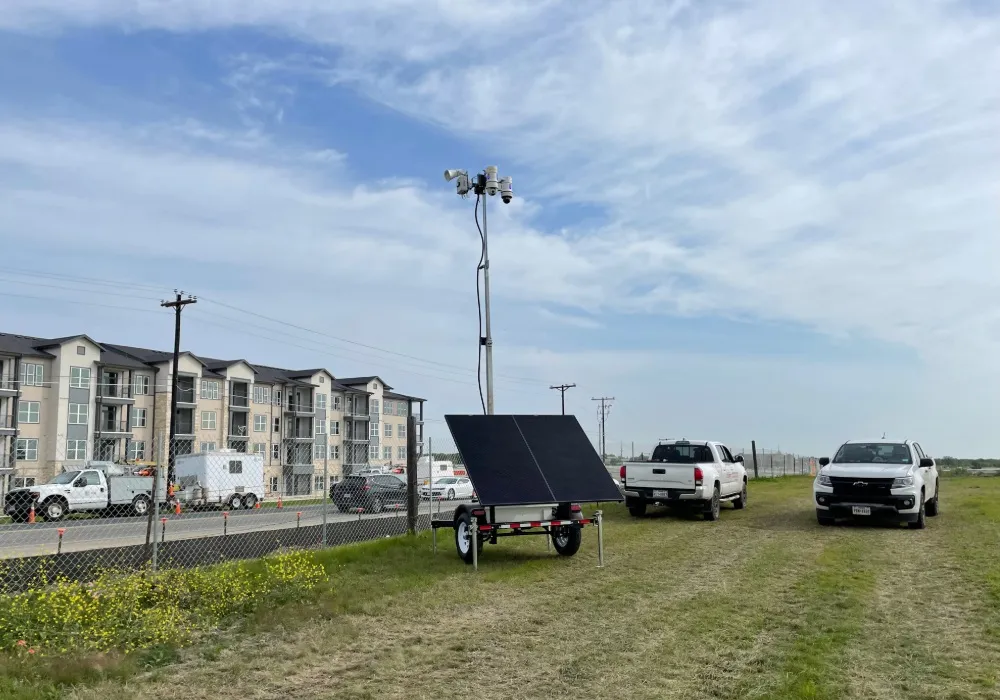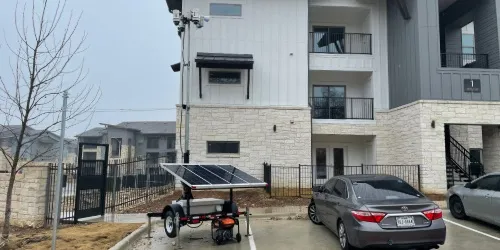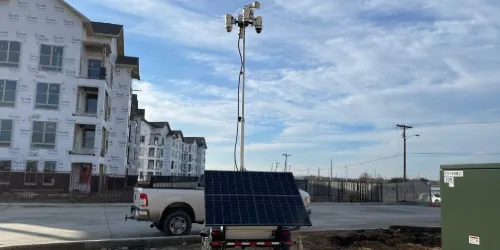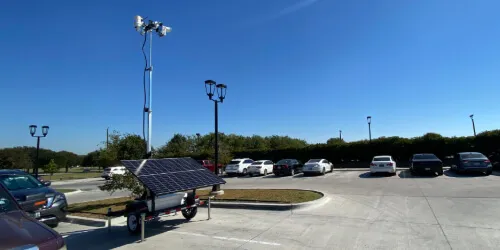Solar Surveillance Trailers are a rapid-deployment mobile video surveillance solution. They combine security cameras with a portable trailer mast, solar panels, and backup battery power.
Their portability and autonomous operation means they can be deployed and relocated within minutes, allowing for immediate security coverage at temporary or off-grid locations like Construction Jobsites
Solar trailers offer multiple benefits compared with typical security camera setups and are typically much more cost-effective than legacy security methods such as physical guards.
Below, we answer some of the common questions about the use of solar trailers, with a specific focus on the way these units are powered.
Commonly Asked Questions About Solar Surveillance Trailers
Solar surveillance trailers have grown in popularity over recent years due to the full visibility monitoring, flexibility, and cost-effectiveness.
We’ve explored common questions around solar surveillance trailers, from cost and ROI to deployment and operations, asking all the questions on your mind.
General Solar Surveillance Trailers FAQs
Before investing in any security solution, it’s essential that you understand the basics of any system, so that you know whether it suits your site or project’s needs.
How does it differ from a fixed surveillance system or a trailer with a generator?
The table below breaks down the differences between solar surveillance trailers, fixed surveillance systems, and trailers using solely generators for power:
|
System Type |
Fixed Surveillance System |
Trailers Powered by Generators |
Solar Surveillance Trailers |
|
Power Source |
Mains power |
Diesel or petrol generators |
Solar panels and battery backup |
|
Key Requirements |
Requires poles, trenching, cabling, civil works, and site infrastructure |
Requires fuel storage, regular refueling, and engine maintenance |
Requires solar panels, batteries to store power, and maintenance |
|
Operational Costs |
High costs due to installation and power requirements |
High due to refueling and regular servicing |
Low due to minimal maintenance and no fuel requirements |
|
Security Coverage |
Limited to where the fixed cameras are installed |
High due to the mobility available from its trailer design |
High as the trailer can be adjusted and moved yourself to enhance coverage |
|
Mobility |
Low (due to permanent installation), expensive to relocate |
Medium because of the trailer design, however, can be dependent on fuel requirements |
High as trailers can be moved easily across sites and locations without any concern on fuel requirements |
|
Best Suited For |
Long-term, permanent infrastructure |
Remote sites with large power load requirements |
Temporary, remote, or off-grid security needs |
What are the typical components of a solar surveillance trailer?
With any solar surveillance trailer, there are some common features they should all have to ensure optimal protection and crime prevention:
- Solar panels that provide the correct power for the surveillance system
- Strong battery backup
- Telescopic mast (ideally 18 to 20-ft high)
- High-quality cameras - look for HD PTZ cameras with IR capabilities
- 4G/5G connectivity
- Live remote monitoring provided 24/7
- Audio and visual criminal deterrents
At minimum, the above features should be included as part of your solar surveillance trailer, however, to ensure the best decision for you, you should consider your requirements and the specific needs you have for a system before investing.
What is the typical use case for a solar surveillance trailer?
Solar surveillance trailers typically suit remote, temporary, and off-the-grid locations. There are several industries that tend to benefit from such systems:
- Construction jobsites
- Critical infrastructure
- Government agencies
- Law enforcement and police
- Parking lots, particularly retail
- Educational institutions and campus security
- Traffic and Highways
- Events
What are the advantages of a solar surveillance trailer?
Compared to manned guards and other traditional benefits, solar surveillance trailers offer various benefits. From providing complete power autonomy and rapid deployment to providing full mobility and security coverage, these systems ensure flexibility without having to skimp on quality.
Other advantages include:
- Low operating costs, especially with providers offering rental agreements
- Eco-friendly and fuel-free, minimizing the need for regular system maintenance
- Ideal for remote locations and temporary environments
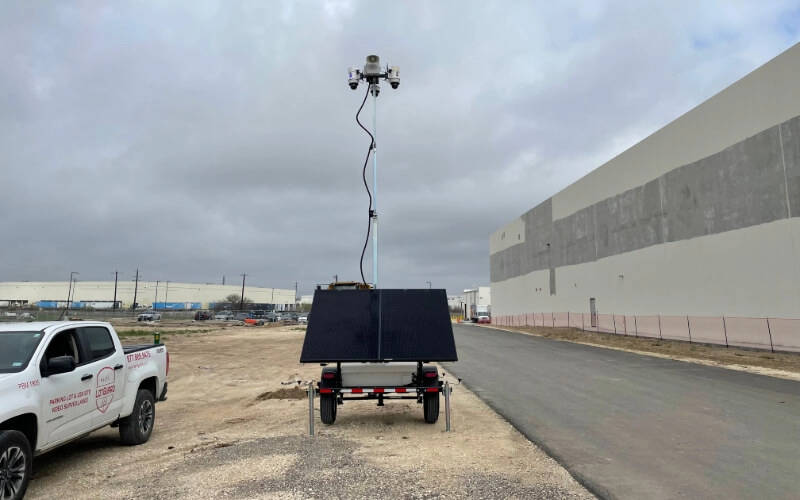
Deployment and Operations FAQs
One of the main considerations businesses will be how quickly a surveillance system can be deployed and operational, and in this section we explore this further on solar surveillance trailers.
How fast can a trailer be deployed or relocated?
Deployment times will vary between providers on when they can supply the surveillance trailers, and then how long it takes to set them up on site.
Generally speaking, deployment takes between 20 to 60 minutes once at the location, however, at WCCTV, basic setups take up to only 20 minutes.
In any instance, installation will depend on a number of factors including the mast type, camera configuration, and environmental setting.
For relocation, most trailers can be moved by yourself and can take only a matter of minutes if moving it across sites. However, it will be provider dependent if you need to relocate to a new site, some will be able to do this in a matter of days (less even).
How do you select the optimal location/orientation for the trailer and solar panels?
It’s important to keep your surveillance trailer operational and avoid downtime, and this means placing it in the best position to receive optimal solar draw for your system.
We’ve formed our top 4 tips on how to ensure your trailer is set in the best location for your solar panels:
- Ensure your solar panels are facing in the best direction for your location to receive maximum sun exposure. This tends to be south-facing.
- Have an elevated vantage point for the cameras on your surveillance trailers.
- Avoid shadows covering your solar panels from any buildings, trees, or objects at that location.
- Avoid high-traffic zones where shadows or coverage are regularly created on your solar panels.
What maintenance tasks are required?
Maintenance of your solar panels is crucial to ensuring maximum solar draw for your surveillance trailers. For businesses, there are a few steps you can take to maintain your solar panels, especially during the winter:
- Remove any debris like dust, vegetation, or snow
- Ensure the optimal angle of your solar panels - this can be completed by your provider
- Position your panels to avoid any debris build-up
- Reduce shade blocking your solar panels
- Ensure you have battery backup on your system
- Monitor performance regularly - providers may supply performance diagnostics software for this
Solar Panel and Power Capabilities FAQs
A lapse in security leaves criminals with the opportunity to enter your site, and this opens your business to theft and vandalism which is costly. Ensuring a strong power source for your system helps to minimize this risk.
Surveillance trailers usually use solar panels with battery backup, however, not all are built the same and it's important to understand the basics on power capabilities.
What Size Solar Panel Does a Solar Surveillance Trailer Need?
Imagine deploying a solar surveillance trailer to protect your critical assets, only to discover that it has run out of juice - leaving your site vulnerable and open to theft.
Unfortunately, this scenario is far too often the reality as inexperienced trailer suppliers underspec the setup required to deliver continuous power supply in times of limited sunlight.
Likewise, some manufacturers will attempt to overcompensate and supply trailers with oversized solar panels - making them cumbersome and difficult to install.
At WCCTV, we manufacture our solar trailers in the USA and have over 20 years of providing off-grid surveillance solutions. We know what it takes to deliver year-round operation.
We specify our solar trailers with 750w - 800w solar panels, balancing the need for a powerful solar draw with the ease of installation required to respond to immediate security needs.
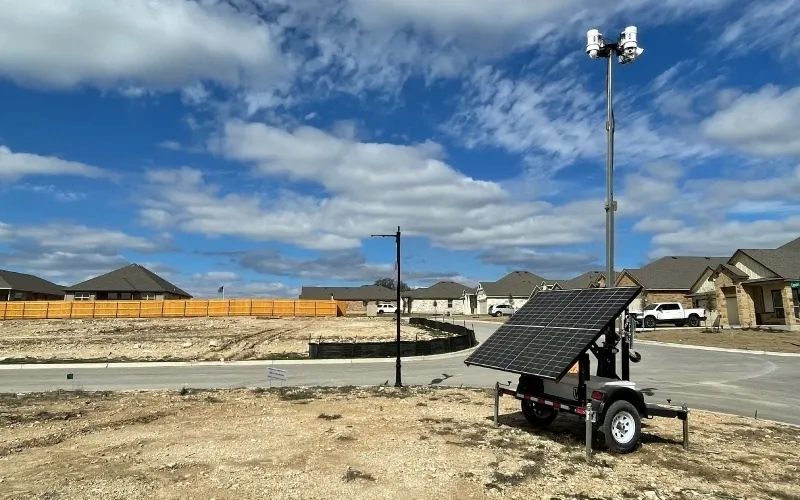
What Kind of Batteries Does a Solar Trailer Need?
Typically, surveillance trailers will utilize either AGM gel batteries or Lithium batteries.
Both of these battery types have unique advantages, and depending on the scenario, one could be more suitable than the other.
In the case of surveillance trailers, AGM batteries are a great option as they offer:
- Zero maintenance requirements
- Durability and reliance in any weather
- Higher storage capacity
- Time tested reliability
While lithium batteries are a great solution in many places, when you need a solution that is reliable, proven, durable, and requires zero user maintenance - AGM batteries have it all.
How is Solar Charge Controlled on a Surveillance Trailer?
Solar surveillance trailers should be fitted with charge controllers.
These devices stop reverse currents from the batteries into the PV modules, help prevent overcharging, and improve overall charge quality. Charge controllers also disconnect power to the loads when the batteries' voltage dips too far.
Depending on your choice, charge controllers come with additional features such as lighting control, remote temperature sensors, a remote meter, and an optional meter.
What Power Management Features Does a Solar Trailer Need?
Keeping an eye on the performance of your batteries and solar panels can be the difference between safety and catastrophe.
A high-quality surveillance trailer should provide all of the following features:
- True battery state-of-charge
- Time remaining feature
- Remote power monitoring and management
- Local remote control
- Performance history
Remote power management is especially vital as it provides a snapshot of power performance, allowing users to monitor, manage, and optimize the power system remotely.
An effective power management platform will allow users to set alerts and alarms to catch potential issues early. This type of software can be provided as desktop software, a mobile app, or (ideally) both.
At WCCTV, we typically hire our solar trailers as part of a completely managed security service. We handle all battery performance monitoring to ensure you have no nasty surprises.
But we make all our management tools available for those who want to be more hands-on.
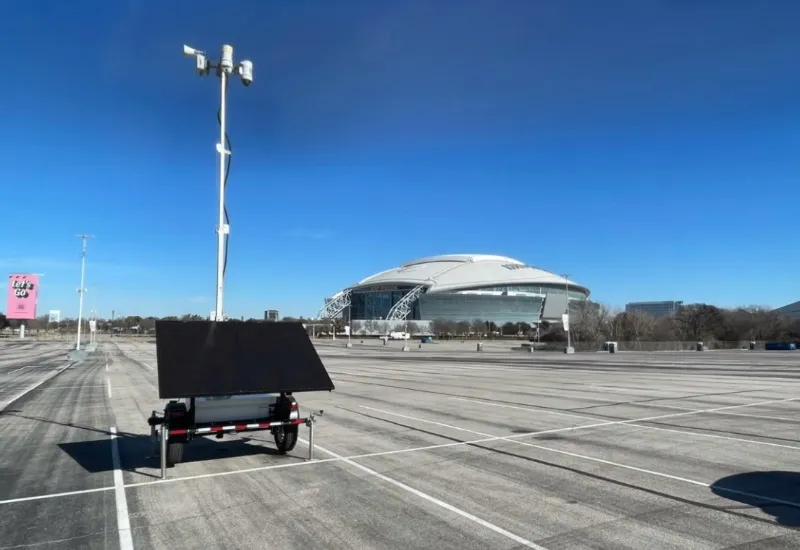
How Long Does a Surveillance Trailer Last Without Sun?
The type of battery, wattage ratings, and power consumption rate will determine how long a solar surveillance trailer can last without direct sunlight.
WCCTV's solar surveillance trailers will run for a minimum of 10 days on battery autonomy compared to other commonly used systems that only provide a maximum of 4 days.
How Long Does it Take to Charge a Solar Trailer?
The recharge rate for a solar surveillance trailer will vary depending on factors such as the solar panel’s wattage ratings and the light conditions.
Even in ideal summer conditions, a solar trailer with a 100, 250, or 400w panel could take several days to completely recharge, which is another reason we always spec 750-800w panels.
The angle and direction of the solar panels will also play a key factor in recharge rates, as there must be direct sunlight on the panel. At WCCTV, we provide full training and instruction on how best to position your panels in your locations.
Cost, Return on Investment (ROI) and Environmental Impact FAQs
Selecting a security solution tends to be heavily influenced by cost and return on investment, especially for temporary projects and sites.
Additionally, the environmental impact of security systems is growing in importance and for industries like construction, could influence the success of tenders.
What is the relative cost comparison: solar trailer vs manned guards?
Manned guarding tends to be an expensive solution; they require holidays, sick days, and overtime payments, all of which add up quickly for a business. This only increases for around-the-clock security and large locations, where multiple guards will be required.
Whereas solar surveillance trailers do not require holidays, breaks, or sick days. In fact, they’re always awake and always on guard, working at a fraction of the cost without needing to skimp on quality.
By switching to WCCTV’s mobile surveillance solutions, you can save up to 88% in security costs, making them extremely cost-effective in comparison to guards.
What are the environmental benefits?
Solar surveillance trailers are not only designed the way they are for power optimization, it’s also to help with their environmental impact. By using solar power, these systems significantly reduce their emissions and in turn support companies in reaching their green goals.
The key environmental benefits are:
- No diesel or petrol fuel consumption
- No generator noise that creates noise pollution
- None/low operating emissions
- Low environmental disturbance as no trenching or groundworks are required
- Improved air quality
- Minimal waste generation
- Long-life service components
Are there hidden costs with them?
Depending on the provider will depend heavily on whether there are hidden costs involved with your solar surveillance trailers.
If they simply provide the equipment, then maintenance, support, and battery replacements will all likely be additional costs.
However, with fully-managed services like the one we provide, you will receive installation, technical and customer support, maintenance, remote monitoring and access, and built-in performance diagnostics all within the cost provided. This means there’s no hidden costs,
Advanced systems will also offer additional features that can be integrated into the system like environmental monitoring, smart detection systems, and LPR cameras, which will likely be an optional extra cost depending on your needs.
How to calculate the ROI of a solar surveillance trailer?
Generally, solar surveillance trailers have strong ROI, however, the only way to truly know this is through calculating the impact of them yourself.
To understand the complete ROI, you need to establish the total cost:
For Renting: Total Cost = (Weekly Rental Rate) × (Number of Weeks)
For Purchasing: Total Cost = Purchase Price + Installation + Monitoring Costs
And then establish the total savings:
Total Savings = Fuel Savings + Maintenance Savings + Guard Savings + Infrastructure Savings + Theft Reduction
Once you have completed these, you need to use the following formula to calculate the ROI of your solar surveillance trailers:
ROI (%) = Total Cost - Total Savings − Total Cost × 100
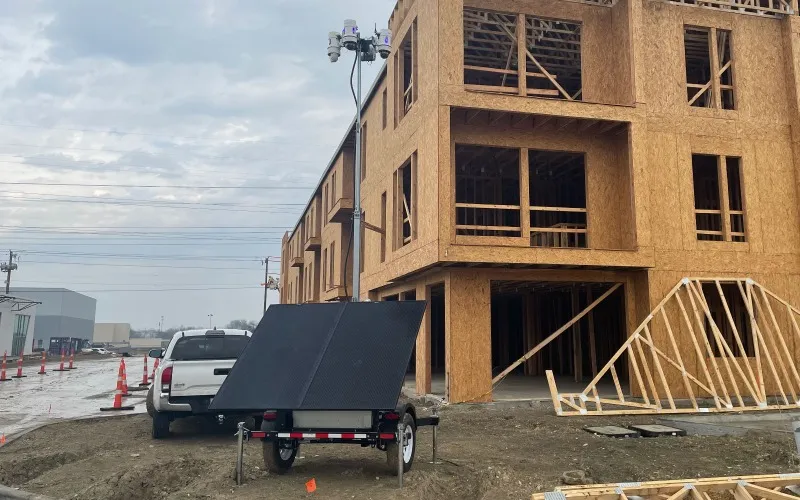
WCCTV: Market-Leading Solar Surveillance Trailers
If you're serious about securing your property, people, or assets, then it pays to do your research on what solar surveillance trailer you're planning to use. Not all solar surveillance trailers are created equally.
We are proud to manufacture solar trailers in the USA, and are continuously working to provide enhanced security that suite multiple industry needs.
Our vast experience working with major construction companies, property managers, government and law enforcement agencies, and critical infrastructure locations has led us to develop the most reliable trailers in the marketplace.
Enquire today to find out how WCCTV’s Solar Surveillance Trailers can protect your site while cutting costs.
